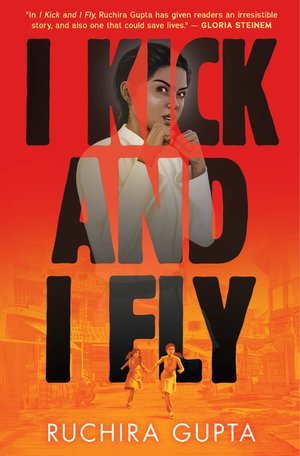Readers of I Kick and I Fly by Ruchira Gupta will be inspired by the strong female characters as well as horrified by the novel’s sex trafficking theme. Set in northern India in a town called Forbesganj located in the state of Bihar, Gupta’s book reveals the story of fourteen-year-old Heera who intimately knows both hunger and homelessness. A member of the nomadic Nat tribe, Heera and her family are members of an oppressed caste. Her people used to be wrestlers and performers, but “overnight [they] were told [they] couldn’t do those things anymore, that [their] entire way of life was illegal” (283). Seeking to survive, they were forced to ask people for a place to live and then sought employment in any job available. One of those jobs was having sex with people for profit.
Even though she hasn’t won the birth lottery, Heera takes inspiration from Bruce Lee and vows that she will not trade her dreams for kung fu and an education for the beatings and torture of prostitution because of superstition and cultural dogma. Despite her efforts and those of her mother and because of his addictions, his ego, and Nat customs, Heera’s father objects to Heera’s dreams. He announces that Heera has been marked to be sold; she has a one year reprieve.
Thinking of running away to Nepal, Heera wishes to join her uncles, train to become a wrestling champion, a pehelewan, and win prize money. As usual, her brother Salman—a caring, kind, and responsible young man who hopes to be a physicist—urges her to use logic. Because Heera is a girl, such dreams are out of bounds for her.
With the sponsorship of Rini Di—the novel’s real hero—Heera does train in kung fu. She becomes fast, focused, and flexible. Through the art of kung fu, Heera learns to defend herself. She realizes that “size is never a true indication of muscular power and efficiency” (308). She also gains certain comforts and the camaraderie of her teammates as she competes. Still, she feels guilt, guilt that Salman has sacrificed his dreams for her, guilt that her mother and baby sister suffer, and guilt that other girls must experience bodily violation. Heera wonders how she can help, how she can inspire other at-risk children, and how she can effect change.
Under the influence of the activism of Rini Di, Heera is determined to win some victory for humanity. Her fear pales in comparison to her desire to help others and the world. After all, the problem of human trafficking is a global one. According to Rini Di, the criminal rings are big and work across countries. Gupta also shares statistics from the United Nations Office for Drugs and Crime that human trafficking is the second largest organized crime in the world, involving billions of dollars.
Heera’s story is one of hope in the face of great odds. It’s about how our bodies belong to us alone and how a community that resolves to make change contagious can succeed when they bond together to combat evil. Inspired by his daughter’s accomplishments, Baba finds pride in Heera, a pride which motivates him to seek his own self-respect.
- Posted by Donna

